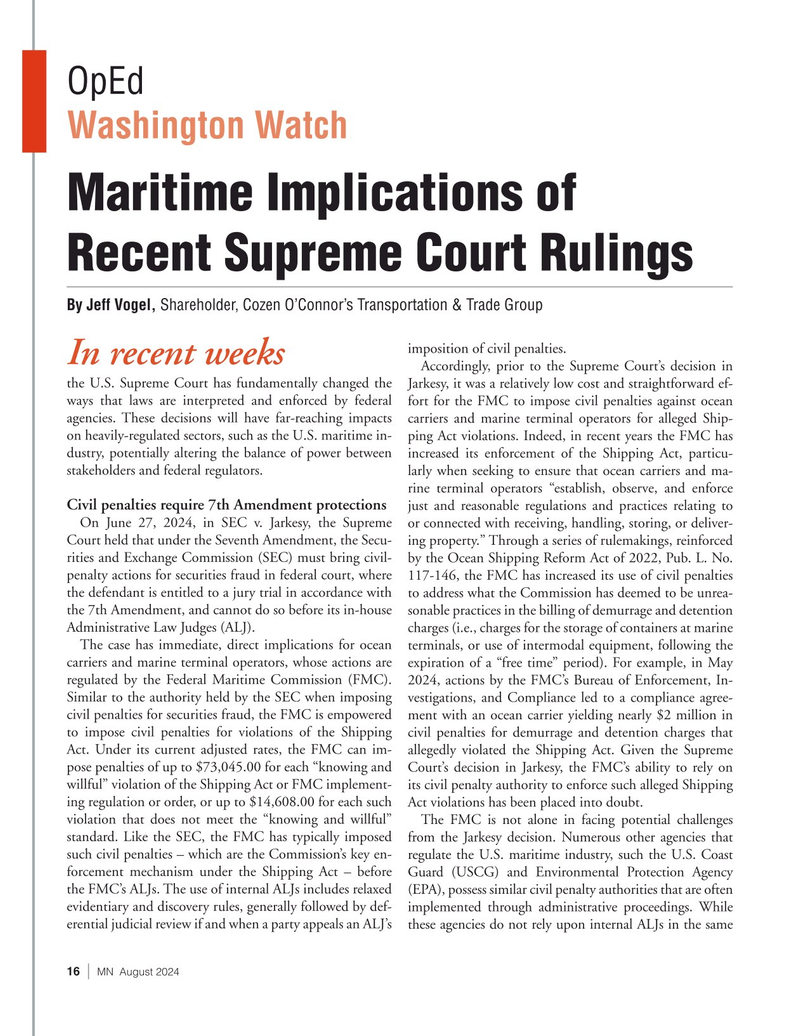
Page 16: of Marine News Magazine (August 2024)
Read this page in Pdf, Flash or Html5 edition of August 2024 Marine News Magazine
OpEd
Washington Watch
Maritime Implications of
Recent Supreme Court Rulings
By Jeff Vogel, Shareholder, Cozen O’Connor’s Transportation & Trade Group imposition of civil penalties.
In recent weeks
Accordingly, prior to the Supreme Court’s decision in the U.S. Supreme Court has fundamentally changed the Jarkesy, it was a relatively low cost and straightforward ef- ways that laws are interpreted and enforced by federal fort for the FMC to impose civil penalties against ocean agencies. These decisions will have far-reaching impacts carriers and marine terminal operators for alleged Ship- on heavily-regulated sectors, such as the U.S. maritime in- ping Act violations. Indeed, in recent years the FMC has dustry, potentially altering the balance of power between increased its enforcement of the Shipping Act, particu- stakeholders and federal regulators. larly when seeking to ensure that ocean carriers and ma- rine terminal operators “establish, observe, and enforce
Civil penalties require 7th Amendment protections just and reasonable regulations and practices relating to
On June 27, 2024, in SEC v. Jarkesy, the Supreme or connected with receiving, handling, storing, or deliver-
Court held that under the Seventh Amendment, the Secu- ing property.” Through a series of rulemakings, reinforced rities and Exchange Commission (SEC) must bring civil- by the Ocean Shipping Reform Act of 2022, Pub. L. No. penalty actions for securities fraud in federal court, where 117-146, the FMC has increased its use of civil penalties the defendant is entitled to a jury trial in accordance with to address what the Commission has deemed to be unrea- the 7th Amendment, and cannot do so before its in-house sonable practices in the billing of demurrage and detention
Administrative Law Judges (ALJ). charges (i.e., charges for the storage of containers at marine
The case has immediate, direct implications for ocean terminals, or use of intermodal equipment, following the carriers and marine terminal operators, whose actions are expiration of a “free time” period). For example, in May regulated by the Federal Maritime Commission (FMC). 2024, actions by the FMC’s Bureau of Enforcement, In-
Similar to the authority held by the SEC when imposing vestigations, and Compliance led to a compliance agree- civil penalties for securities fraud, the FMC is empowered ment with an ocean carrier yielding nearly $2 million in to impose civil penalties for violations of the Shipping civil penalties for demurrage and detention charges that
Act. Under its current adjusted rates, the FMC can im- allegedly violated the Shipping Act. Given the Supreme pose penalties of up to $73,045.00 for each “knowing and Court’s decision in Jarkesy, the FMC’s ability to rely on willful” violation of the Shipping Act or FMC implement- its civil penalty authority to enforce such alleged Shipping ing regulation or order, or up to $14,608.00 for each such Act violations has been placed into doubt.
violation that does not meet the “knowing and willful” The FMC is not alone in facing potential challenges standard. Like the SEC, the FMC has typically imposed from the Jarkesy decision. Numerous other agencies that such civil penalties – which are the Commission’s key en- regulate the U.S. maritime industry, such the U.S. Coast forcement mechanism under the Shipping Act – before Guard (USCG) and Environmental Protection Agency the FMC’s ALJs. The use of internal ALJs includes relaxed (EPA), possess similar civil penalty authorities that are often evidentiary and discovery rules, generally followed by def- implemented through administrative proceedings. While erential judicial review if and when a party appeals an ALJ’s these agencies do not rely upon internal ALJs in the same 16 | MN August 2024

 15
15

 17
17
